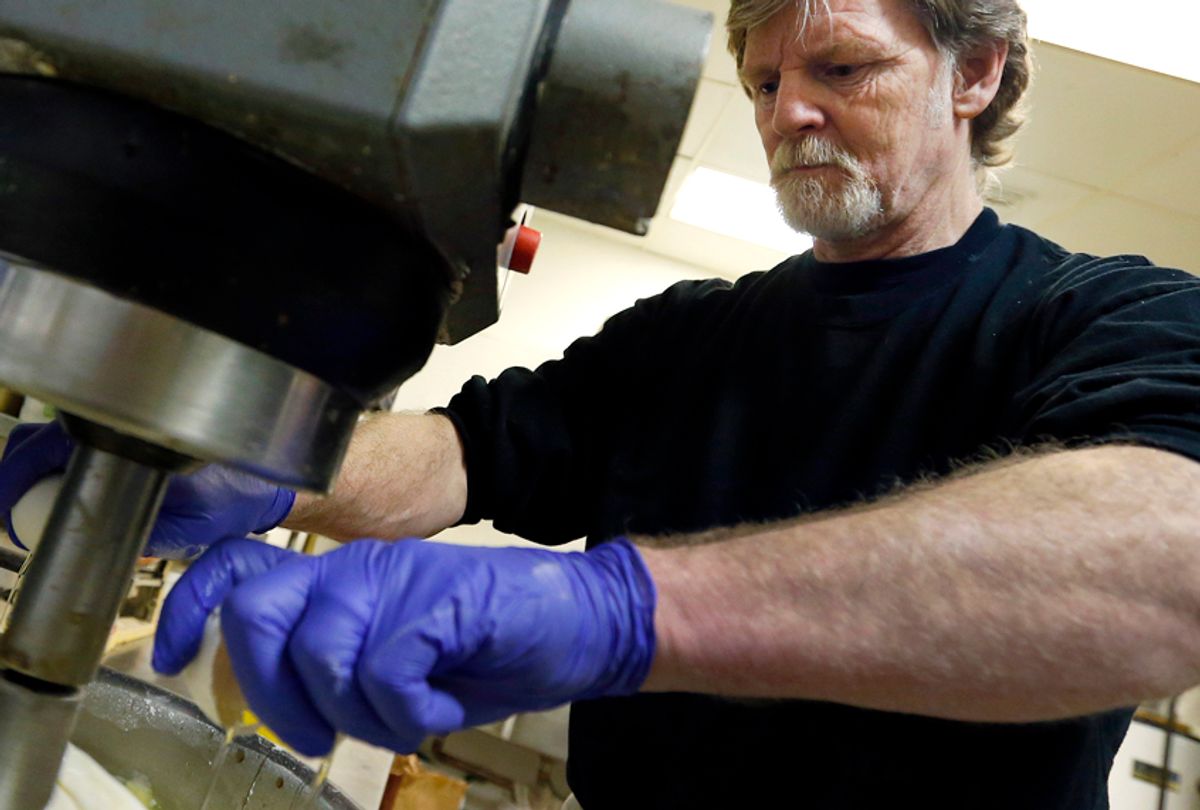Today, the Supreme Court is scheduled to hear arguments in Masterpiece Cakeshop v. Colorado Civil Rights Commission, a dispute over whether a Colorado baker can refuse to sell a cake to a same-sex couple for their wedding simply because their union offends his religious beliefs. A ruling against the couple would not only mark a major setback in the fight for LGBT equality, it would threaten to unravel hard-won legal protections for women.
In a friend-of-the-court brief recently filed with the Supreme Court, the National Women’s Law Center and 39 other organizations, including the Center for Reproductive Rights, argued that allowing businesses to discriminate against gay and lesbian customers opens the door for discrimination against women as well. There are clear parallels between Masterpiece Cakeshop’s claim that homophobia warrants a privileged place under the law (so long as it’s ostensibly rooted in religious faith) and arguments historically used to justify other forms of discrimination.
Sadly, religion has often been invoked to justify racial discrimination (as the NAACP Legal Defense Fund explains in a separate brief), and women have long faced sexism stemming from the invocation of religion. Married women working at religious schools have been denied health insurance coverage because their employer believed a woman couldn't be a “head of household,” or lost their jobs after becoming pregnant because their employer believed mothers should stay home with young children. In 1998, a religious school fired an unmarried teacher after she became pregnant — which the school explained was “clear evidence that she had engaged in coitus while unmarried.” In none of these cases did the courts accept that religion could be used to excuse sexism. To be clear, there are many people of faith and religion that strongly oppose discrimination.
A ruling for Masterpiece Cakeshop would threaten to legitimize prohibited actions that harm or subjugate women based on certain interpretations of religion. It would also go against decades of law and judicial precedent and the settled principle that joining in commerce means you can’t discriminate against customers or employees. The founders envisioned a country where citizens were free to have their own beliefs, and where people of different religions would interact with each other in the public sphere. That’s why the freedom to exercise religion has long been limited so as to stop at the point where it inflicts harm upon other people.
Masterpiece Cakeshop nonetheless insists that it has the right to refuse service to prospective customers because its owner opposes same-sex marriage. The shop bases its claim on two specious arguments. First, it argues that selling a wedding cake to a same-sex couple amounts to an “endorsement” of same-sex marriage, which violates its owner’s religious beliefs. Second, it argues that cake-making is a uniquely “creative” business, wrapping anti-LGBT discrimination within a claim to freedom of expression.
The implications of each argument are enormous. If selling a wedding cake amounts to an “endorsement” of same-sex marriage, then a restaurant owner or manager with a religious objection to women working outside of the home could refuse to serve a woman at a business lunch. A tailor with a religious objection to pregnancies outside of marriage could refuse to alter clothes for a pregnant woman without a wedding ring. A bed-and-breakfast owner who opposes interracial marriage on religious grounds could refuse to rent his honeymoon suite to an interracial couple.
Cloaking discrimination under “freedom of expression” has far-reaching consequences as well. If a bakery can deny its “creative” services to a same-sex couple, then a print shop could deny custom business cards to women when the shop owner’s religion disapproves of women working outside the home. A hair salon owner who disapproves of divorce could refuse employees or customers who have left their marriages. A florist who opposes particular medical procedures based on religious beliefs could refuse to select and arrange flowers for a woman who became pregnant with the assistance of in-vitro fertilization. A jewelry designer could refuse to provide a ring to a Jewish couple for their wedding.
There’s nothing novel about using religion as a shield for discrimination, of course. Masterpiece Cakeshop is simply recycling tired, roundly rejected arguments against a new set of civil rights — marriage equality for same-sex couples. The Court cannot accept those arguments in the LGBT context without undermining hard-won gains in equality for women and other groups and inviting a regression to the dark parts of our past we thought we’d left behind: a world of segregated lunch counters and women confined to the home.

Shares